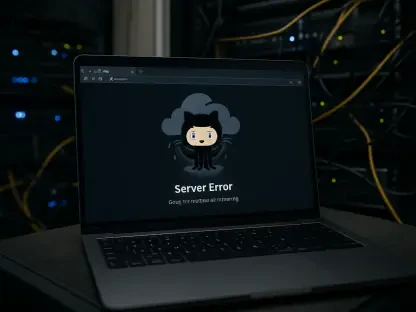Within the increasingly complex software development landscape, security concerns have become more than just a peripheral obligation. Developers are now dedicating a substantial portion of their time and energy to security-related tasks, a trend that has implications both for productivity and for the security posture of the applications being developed. According to an IDC study commissioned by JFrog, developers are currently spending an average of 19% of their weekly working hours on tasks such as manual application scan reviews, context switching, and secrets detection—a significant investment of time and resources.
Time and Resource Allocation in Developer Security Tasks
The Impact on Developer Efficiency
One critical finding from the IDC study reveals that this allocation of time is extending beyond regular work hours, compelling organizations to invest approximately $28,000 per developer annually on security efforts. This financial burden underscores a more significant issue: the diversion of developers from their core responsibilities. Senior developers and team leaders have voiced concerns that security requirements are hampering their ability to innovate and deliver new business applications promptly. This shift in focus results in inefficiency that is further exacerbated by the necessity to toggle between multiple security tools, thereby increasing complexity and consuming even more time.
Developers face particular frustration from the need for manual security scan reviews, which take up an average of three and a half hours each week. These reviews often involve dealing with false positives and duplicates, detracting from time that could otherwise be spent on more critical development tasks. The tedious process of manual fixes and constant context switching not only slows down productivity but also lowers morale within development teams. Another major pain point is secrets scanning, which requires considerable time to interpret results, update code, and implement necessary changes in secrets management. This ongoing burden highlights the broader impact of security tasks on overall developer efficiency.
The Problem with Tool Switching
A significant 70% of developers report that their efficiency is reduced due to having to switch between different security tools. This constant switching disrupts their workflow and adds an unnecessary layer of complexity to an already challenging task. Tools like Infrastructure as Code (IaC), which automate IT infrastructure provisioning and management, must be frequently scanned to ensure security compliance. Unfortunately, this necessity only adds to the workload and can become a significant hindrance to productivity. Despite these frequent scans, a mere 23% of developers engage in static application security testing (SAST) scans before code deployment, leaving significant vulnerabilities unaddressed.
The need for streamlined security tools is evident, as the current fragmented landscape punctuates inefficiency and exacerbates developer frustration. The reliance on multiple tools complicates the identification of genuine issues, often burying critical vulnerabilities beneath a deluge of false positives. Consequently, developers spend valuable time addressing non-issues, leading to delayed deployments and reduced output quality. The overarching trend indicates a pressing need for more integrated security solutions that can seamlessly fit into the development lifecycle, thereby minimizing the disruptions caused by current fragmented tools and processes.
The Inefficiencies of Current Security Processes
DevSecOps and Developer Burden
While the principles of DevSecOps aim to integrate security seamlessly into the development process, the reality is proving to be more complicated. The IDC study suggests that existing tools and processes are not only inefficient but also costly. Companies must invest in more streamlined security processes and better tools to enhance developer efficiency while adequately protecting the software supply chain. The current scenario, wherein developers spend a substantial portion of their time on security tasks, suggests a mismatch between the goals of DevSecOps and its execution. Streamlining these processes can reduce the time developers spend context-switching and managing security tool overload.
Beyond tool inefficiency, there is also a need for consistent training and upskilling in security practices for developers. Without the proper training, even the most sophisticated tools cannot compensate for the lack of knowledge and expertise. Training programs tailored to security best practices can empower developers to address security issues more effectively, thereby reducing the time spent on manual reviews and fixes. Investment in both tools and training represents a dual approach to tackling the current inefficiencies in software security processes, ultimately fostering a more secure and productive development environment.
Additional Research Insights
In today’s increasingly complex software development landscape, security concerns have evolved from being a peripheral obligation to a primary focus. Developers now find themselves allocating a significant portion of their time and energy to security-related tasks. This shift has notable implications for both their productivity and the overall security posture of the applications they are working on. A recent study by IDC, commissioned by JFrog, revealed that developers are currently spending an average of 19% of their weekly working hours on security tasks. These tasks include manual application scan reviews, context switching, and the detection of secrets. This statistic highlights the substantial investment of time and resources that developers must commit to ensure the security of their applications. The increasing complexity of software systems necessitates this focus, as even minor vulnerabilities can lead to significant security breaches. Therefore, integrating robust security practices within the development process has become imperative for creating secure and reliable software.









